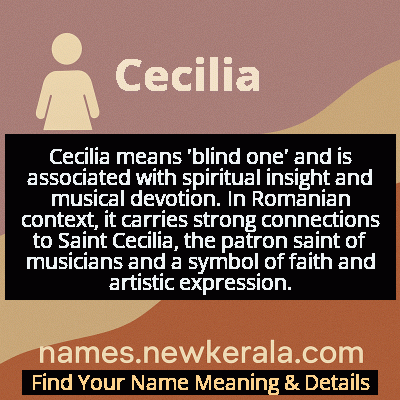Cecilia Name Meaning & Details
Origin, Popularity, Numerology Analysis & Name Meaning of Cecilia
Discover the origin, meaning, and cultural significance of the name CECILIA. Delve into its historical roots and explore the lasting impact it has had on communities and traditions.
Name
Cecilia
Gender
Female
Origin
Romanian
Lucky Number
6
Meaning of the Name - Cecilia
Cecilia means 'blind one' and is associated with spiritual insight and musical devotion. In Romanian context, it carries strong connections to Saint Cecilia, the patron saint of musicians and a symbol of faith and artistic expression.
Cecilia - Complete Numerology Analysis
Your Numerology Number
Based on Pythagorean Numerology System
Ruling Planet
Venus
Positive Nature
Harmonious, responsible, caring, and artistic.
Negative Traits
Overly idealistic, superficial, possessive, or jealous.
Lucky Colours
Pink, turquoise.
Lucky Days
Friday.
Lucky Stones
Diamond, turquoise.
Harmony Numbers
2, 3, 9.
Best Suited Professions
Artists, musicians, teachers, healthcare workers.
What People Like About You
Warmth, nurturing nature, artistic flair.
Famous People Named Cecilia
Saint Cecilia
Christian Martyr and Saint
Patron saint of musicians, celebrated for her devotion to Christianity and musical talent
Cecilia Bartoli
Opera Singer
World-renowned mezzo-soprano known for interpretations of Rossini and Mozart
Cecilia Cheung
Actress and Singer
Hong Kong actress and Cantopop singer, winner of Hong Kong Film Awards
Cecilia Payne-Gaposchkin
Astronomer and Astrophysicist
Discovered that stars are composed mainly of hydrogen and helium
Name Variations & International Equivalents
Click on blue names to explore their detailed meanings. Gray names with will be available soon.
Cultural & Historical Significance
The name's musical connections have inspired countless artistic works, including Henry Purcell's 'Ode to St. Cecilia' and Benjamin Britten's 'Hymn to St. Cecilia.' In Romanian culture, Cecilia embodies both religious devotion and artistic sensibility, reflecting the country's rich heritage of Orthodox faith and folk music traditions. The name has maintained its popularity across centuries, adapting to different cultural contexts while preserving its core associations with faith, music, and feminine strength. The celebration of Saint Cecilia's feast day on November 22nd continues to be observed in many Christian communities, particularly those with strong musical traditions.
Extended Personality Analysis
Women named Cecilia are often perceived as creative, intuitive, and spiritually inclined individuals. They tend to possess a natural artistic sensibility, whether expressed through music, visual arts, or literature. Their name's association with the patron saint of music often translates into an appreciation for beauty and harmony in all aspects of life. Cecilia's are typically described as having a calm, composed demeanor with an inner strength that helps them navigate challenges with grace.
Many Cecilia's exhibit strong empathetic qualities and emotional intelligence, making them excellent listeners and supportive friends. They often have a refined taste and appreciation for culture, combined with a practical approach to life's demands. The name suggests someone who balances tradition with modernity, maintaining core values while adapting to contemporary circumstances. Their intuitive nature often gives them insight into others' feelings, making them natural peacemakers and mediators in social situations. While they may appear reserved initially, Cecilia's often reveal deep passion and conviction about their beliefs and creative pursuits.
Modern Usage & Popularity
Cecilia remains a popular and timeless name in Romania and internationally. In recent decades, it has experienced a resurgence in popularity, ranking consistently in the top 200 names in many Western countries. The name appeals to modern parents seeking a classic yet distinctive name with cultural depth and musical associations. In Romania specifically, Cecilia maintains strong traditional appeal while feeling contemporary, often chosen by families wanting to honor religious heritage without selecting an overtly biblical name. Its elegant sound and international recognizability make it a practical choice in our globalized world, while its rich history provides meaningful depth. The name's versatility allows for various nicknames like Cece, Celia, or Lia, giving bearers flexibility in how they present themselves across different contexts and life stages.
Symbolic & Spiritual Meanings
Symbolically, Cecilia represents the paradox of spiritual insight despite physical limitation—the 'blind one' who sees truth more clearly than those with sight. This extends metaphorically to represent inner vision, intuition, and the ability to perceive deeper truths beyond surface appearances. The name embodies the transformative power of music and art as spiritual conduits, suggesting that true understanding comes through senses beyond the physical. Cecilia also symbolizes feminine strength in adversity, representing grace under pressure and the triumph of faith and artistry over worldly challenges. The name carries connotations of purity, devotion, and the eternal nature of artistic expression as a bridge between earthly and divine realms, making it a powerful symbolic choice representing both cultural heritage and personal spirituality.

